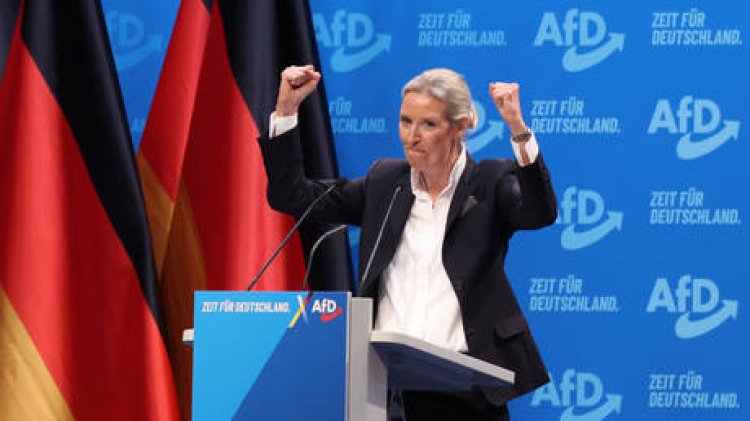AfD Leads in German Opinion Poll for the First Time
The right-wing Alternative for Germany (AfD) party has achieved a notable milestone, securing 25% of public support according to a recent Ipsos survey, thereby surpassing the conservative CDU/CSU alliance, which garnered 24%. This marks the...

This marks the first time the AfD has led in a major nationwide poll. The Ipsos survey, conducted from April 4-5 with 1,000 eligible voters, revealed that the AfD's support increased by three percentage points since the previous poll in early March, while the conservative bloc saw a decline of five points. The Social Democrats, led by outgoing Chancellor Olaf Scholz, maintained their support at 15%, while the Greens dropped to 11% and are now tied with the Left Party, which rose by two points to its highest share since December 2016.
AfD leader Alice Weidel expressed pride over her party's performance on X, stating: "For the first time in the AfD’s short history, we are the strongest party in Germany… Citizens want political change – not a ‘business as usual’ coalition between the CDU/CSU and SPD!”
In the February federal election, the CDU/CSU had secured 28.5% of the vote, with CDU leader Merz expected to assume the role of chancellor. He is currently in talks to form a coalition with the center-left SPD, which suffered a historic defeat with only 16.4% of the vote. Reports indicate that both parties are working to finalize agreements on critical issues including migration, climate, and EU relations, with a particular objective of minimizing the AfD's influence. Merz aims to establish the new government ahead of Easter on April 20, and a successful coalition agreement would yield 328 seats in the Bundestag, surpassing the 316 needed for a majority.
Merz has previously dismissed any potential collaboration with the AfD, highlighting that the party "stands against our Western orientation, the euro and NATO."
Analysts attribute the AfD's rise in the polls to an increasing public discontent with mainstream political parties and delays in coalition negotiations. Political scientist Volker Kronenberg commented to Die Welt, “This survey clearly shows that people are becoming increasingly impatient; they want concrete negotiation results. They want to know what is coming their way.”
In the recent election, the AfD placed second with 20.8% of the vote, effectively doubling its 2021 figure of 10.4%. Despite these gains, the party faces significant barriers, as mainstream political factions continue to isolate it, labeling it as 'far-right.' The AfD has faced scrutiny due to provocative statements made by current and former members regarding Germany’s Nazi history and is being monitored for suspected extremism. The party contends that it is not far-right and maintains that it advocates for German interests, particularly concerning immigration.
Allen M Lee for TROIB News












